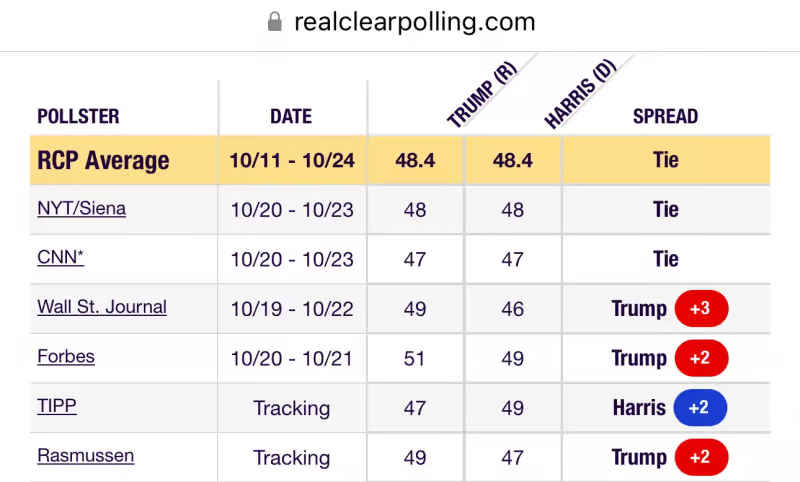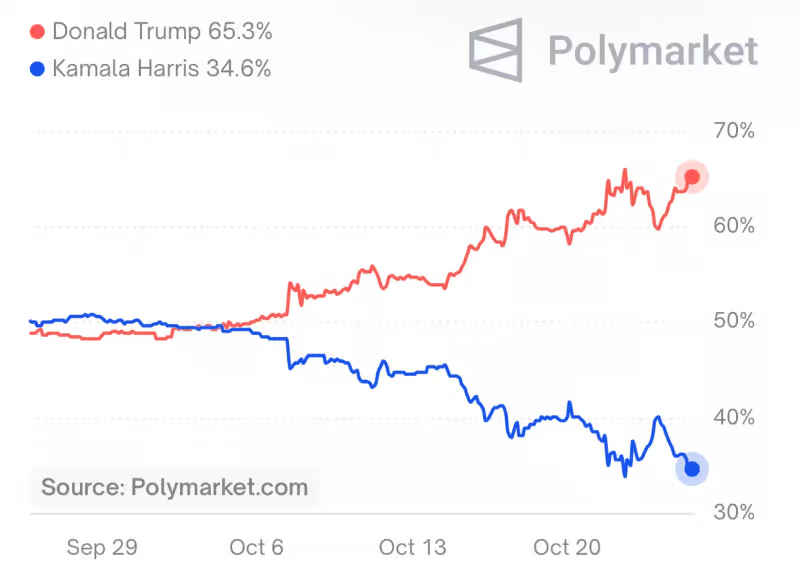Trump enjoys the momentum. Four of the most recent major national polls show him up 2 to 3%, while Democratic-friendly outlets like the New York Times and CNN both show a TIE race in their final surveys.
The 2016 and 2020 elections were razor close even though Clinton (5%) and Biden (8%) had solid polling leads at this point. We need to contemplate a Trump win not only in the electoral college but also in the popular vote.

Here are some thoughts:
- JD Vance ascendant, obviously. Big implications for the Republican trajectory.
- Will Trump replace Fed chairman Jay Powell? Or merely jawbone for a change in policy? In a new CNBC interview, former Fed governor Kevin Warsh argues that the Fed has juiced both the stock market and inflation. Would reducing inflation, which Trump has promised, automatically therefore lead to a stock market correction and economic slowdown? Not necessarily. If Trump unleashes productive economic activity and Congress ends the fiscal blowout, the Fed could normalize monetary policy without causing a major economic slump.
- Will Trump impose the broad and deep tariffs he proposed? Or will he mostly threaten them as a bargaining tool with China? I’m betting on some of the former but more of the latter. We notice, however, Trump allies are floating a trial balloon to replace income taxes with tariffs. As impractical and improbable as that may be, we’re glad to see the mention of radical tax reform reemerge after too long an absence from the national discussion.
- How will he organize the “deportation” of illegal migrants? In the best case, it will be difficult. There will be scuffles and chases. Critics will charge the new Administration as cruel and worse. How much stomach will Republicans have for a messy process? One idea would be to offer a “reverse amnesty” – if you leave peacefully and agree not to return illegally, we will forgive your previous illegal entry(s) and minor violations. This would incentivize self-identification and quiet departure. Plus it would help authorities track those leaving. Would migrant departures truly hit the economy, as critics charge? We doubt large effects. Substantial native populations are still underemployed or absent from the workforce.
- We should expect a major retrenchment of regulatory intrusions across the economy – from energy to crypto. Combined with recent Supreme Court action, such as the Chevron reversal, and assisted by the Elon Musk’s substance and narrative, it could be a regulatory renaissance. Extension of the 2017 tax cuts also becomes far more likely.
- Trump has never worried much about debt, deficits, or spending. But he’s tapped Elon Musk as government efficiency czar. It’s an orthogonal approach to spending reform instead of the traditional (and unsuccessful) Paul Ryan playbook. Can this good cop-bad cop duo at the very least return out-of-control outlays to a pre-Covid path? Can they at least cancel purely kleptocratic programs, such as the $370-billion Green Energy slush funds? Might they go even further – leveraging the unpopular spending explosion and resulting inflation to achieve more revolutionary effects on government spending and reach? Or will the powerful and perennial forces of government expansion win yet again, sustaining a one-way ratchet not even Elon can defeat?
- What if the economy turns south? One catalyst might be the gigantic unrealized bond losses on bank balance sheets; another might be commercial real estate collapse. Although reported GDP growth has been okay, the inflation hangover is helping Trump win on the economy. But many believe the post-pandemic economic expansion is merely a sugar-high and has already lasted longer than expected. A downturn early in Trump’s term could complicate many of his plans.
- How will NATO and its transatlantic network respond? Or more generally, what will the neocon and neoliberal hawks, concentrated in DC and the media, but little loved otherwise, do? Does this item from Anne Applebaum — arguing Trump resembles Hitler, Mussolini, and Stalin all rolled into one — portend continued all-out war on prudent foreign policy? Or will they adopt a more sophisticated approach? If the neocons move wholesale and formally (back) into the Democratic fold, how long will the coalition of wokes and militarists hold? On the economic front, Europe, already underperforming vis-a-vis the US, will fall even further behind without big changes. Reformers should gain at the expense of the transatlantic WEF-style bureaucrats.
- Can Trump avoid another internal sabotage of his Administration? Before then, if the election results are tight, will the Democrats seek to complicate or even block his inauguration? Can he win approval for his appointees in the Senate? Can he clean house across the vast public agencies? How long will it take to recruit, train, and reinvigorate talented military leadership, which we chased away in recent years? And how will Trump counter – and avoid overreacting to – taunts, riots, unrest, and lawfare, designed to bolster the case he’s an authoritarian?
- Will the Democrats reorient toward the center, a la Bill Clinton? Or will the blinding hatred of Trump fuel yet more radicalism? Orthodox political thinking suggests a moderation. Especially if Trump wins the popular vote, or comes close, pragmatic Democrats will counsel a reformation. James Carville, for example, already complains that his party careened recklessly away from male voters. And Trump’s apparent pickups among Black and Latino voters complicate the Democrats’ longstanding identity-focused strategy. Other incentives might push toward continued belligerence and extreme wokeness, however, and thus an intra-party war.
- Will the half of the country which inexplicably retains any confidence in the legacy media at least begin rethinking its information diet and filters? Or has the infowarp inflicted permanent damage?
- Will big business, which shifted hard toward Democrats over the last 15 years, recalibrate toward the GOP? Parts of Silicon Valley over the last year began a reorientation — e.g. Elon Musk, Marc Andreessen, David Sacks, and before them, Peter Thiel in 2016. But those are the entrepreneurs. In the receding past, businesses large and small generally lined up against government overreach. Then Big Business and Big Government merged. Now, a chief divide is between politically-enmeshed bureaucratic businesses and entrepreneurial ones. Does the GOP even want many of the big guys back? The GOP’s new alignment with “Little Tech” is an exciting development, especially after being shut out of Silicon Valley for the last two decades.
- Industry winners: traditional energy, nuclear energy, Little Tech. Industry losers: Green Energy, Big Tech, Big Pharma, Big Food. Individual winners: X (nee Twitter), Elon Musk, RFK, Jr.
- How will the Censorship Industrial Complex react? A Trump win will pose both a symbolic and operational blow to governmental, non-governmental, old media, and new media outlets determined to craft and control facts and narratives. It will complicate their mission, funding, and organizational web. Will they persist in their “mis/disinformation” framing and their badgering of old media and social media companies to moderate content aggressively? Or will they devise a new strategy? A.I. is pretty clearly the next frontier in the information wars. How will those who propagandize and rewire human minds attempt to program and prewire artificial ones?
- How will Trump integrate RFK, Jr. and his movement? Will RFK, Jr. achieve real influence, especially on health issues? Big Pharma and Big Public Health will wage a holy war to block reforms in general and accountability for Covid mistakes in particular.
- Trump has promised to end the war between Russia and Ukraine. On one hand, it should be easy. Despite what you hear from DC media and think tanks, Ukraine is losing badly. Hundreds of thousands are dead, and its military is depleted and faltering. Ukraine should want a deal quickly, before it loses yet more people and territory. Russia, meanwhile, always said it wants a deal, even before the war started, focusing on Ukrainian neutrality. Why Ukrainian neutrality should bother the US was always a mystery. And yet even critics of the West’s support for Ukraine, who want an agreement, think it will be difficult to achieve. The Western foreign policy establishment has invested too much credibility and emotion. It will charge “appeasement” and “betrayal” and make any deal difficult for Trump. Russia, meanwhile, has secured so much territory and now has Odessa and Kharkiv in its sights. Putin will not be eager to accept a deal he would have taken in 2021 or before. The far better path for all involved was a pre-war agreement, or the one negotiated but scuttled in April 2022.
- What if A.I. launches a new productivity boom, enabled by an agenda of energy abundance, including a nuclear power revival? The economic tailwinds could remake politics even more than we currently see.
- Can Trump, having run and won his last campaign, consolidate gains by reaching out and uniting the portions of the country willing to take an extended hand?

You can “count” on him not winning…..
Doesn’t matter if Trump wins, he won’t be allowed